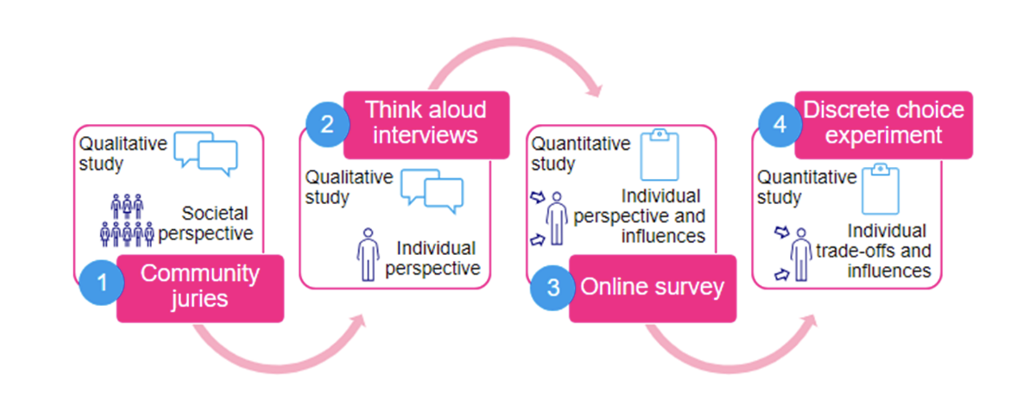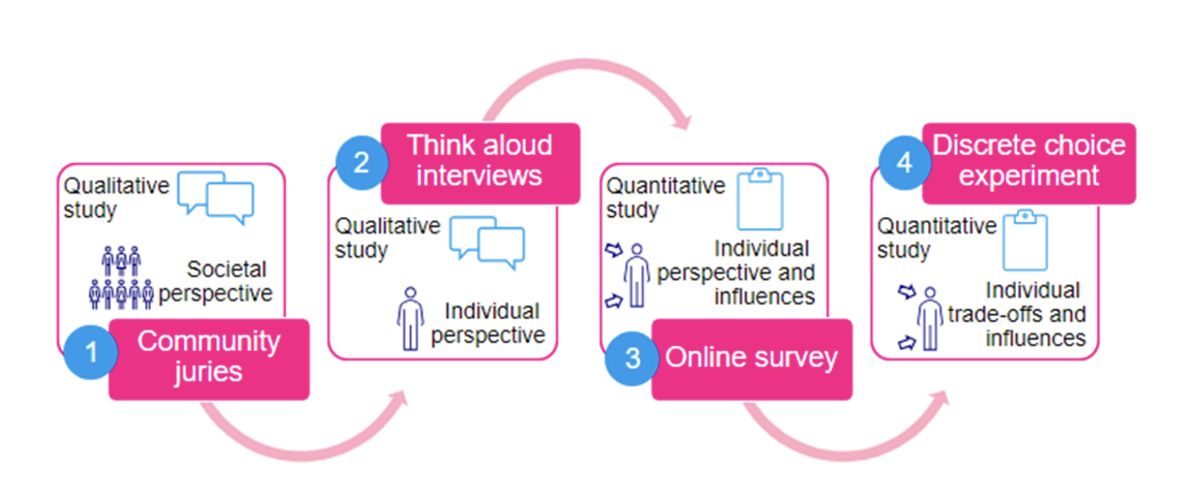
Submitted by James Cantwell on Thu, 12/12/2024 - 16:07
Researchers from the University of Cambridge and Queen Mary University of London have found that members of the public are receptive to the idea of using risk-based approaches and innovations within cancer healthcare, in a research study commissioned by Cancer Research UK (CRUK).
The report of this research marks a new innovative step in CRUK’s long-standing focus in supporting the translation of scientific discoveries into interventions that benefit everyone. The use of novel technology and innovative approaches for the early detection and diagnosis (EDD) of cancer is one way in which this can be achieved. Published in September 2024, the report sits alongside the Early Detection and Diagnosis (EDD) of Cancer Roadmap which outlines the collective efforts from government, industry, charities and researchers, required to deliver more impactful progress on EDD.
Innovative risk-based approaches, such as risk-stratified screening, are a key component to the future cancer landscape. These approaches have implications for early detection and prevention, with the potential to improve patient outcomes through personalised cancer pathways.
Among the findings, the study underscored the importance of understanding perceptions of novel technology and innovations among patients and the public, and makes a series of recommendations to inform the development of such innovations.
The RIBBONS Project
The Public Perceptions to Risk-Based Innovations (RIBBONS) project was commissioned by CRUK and led by Dr Becky Dennison, Research Associate, and Dr Juliet Usher-Smith, Associate Professor of General Practice, both at the Primary Care Unit (PCU), and Jo Waller, Professor of Cancer Behavioural Science at Queen Mary University of London.
As a part of the project, four studies were conducted to capture societal perspectives on the integration of innovative approaches: a set of community juries, a survey, a series of think-aloud interviews, and a discrete choice experiment (see image below). These studies allowed researchers to identify aspects of risk-based innovation that were more likely to increase their acceptability among patients and the general public.
Image: Four studies captured societal perspectives on the integration of innovative approaches
Through the studies, the research team identified a multitude of factors that impact people’s acceptance of innovations and their approaches. In summary, people who took part in the studies wanted innovations to early detection and diagnosis to:
- Be accurate
- Be easy to complete (including providing support to those who need it)
- Be easy to opt out of (if required)
- Be secure (in respect to the use of data)
- Be transparent
- Maintain personal freedom
- Not compromise doctor-patient relationships
- Not widen inequalities.
Discussing the findings, Dr Becky Dennison, Research Associate at the Primary Care Unit, Department of Public Health and Primary Care, commented:
“Overall, members of the public surprised us with their openness and eagerness for risk-based innovations. Nevertheless, we found that maximising acceptability is complex and that views varied by different factors like peoples’ backgrounds and existing knowledge of technology. Understanding and interpreting these varied perspectives will be essential to the uptake of new innovations, to avoid creating or exacerbating social inequalities, and to improve the likelihood of successful implementation.
We outlined a series of recommendations to inform the development, communication and implementation of technologies that will support engagement from the public. One such aspect is the need for the technology to be intuitive and logical at multiple levels, including how it is used to collect data, how it is used to estimate cancer risk, and how that informs policies for screening or referral to investigate symptoms. We hope that innovators will make use of these recommendations, as well as the findings being used widely within research, industry and policymaking”.
Commenting on the impact of this work and next steps to engaging with patients and the public with regards to these new approaches, ‘Samantha Harrison, the Head of Strategic Evidence and the International Cancer Benchmarking Partnership at Cancer Research UK’ said:
“The Early Detection and Diagnosis Roadmap highlighted public acceptance of risk-based approaches as crucial for the equitable and expedited adoption and implementation of cancer innovations. This research has deepened our understanding of how the public view this type of approach to screening and early diagnosis, and has provided vital insight on the potential variation in acceptability amongst different groups. CRUK will continue engaging with and supporting this type of research to better understand how the public thinks about cancer innovations.”
Access the full RIBBONS report here. Access the executive summary here.

